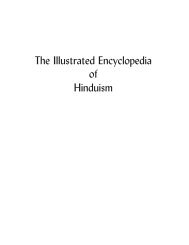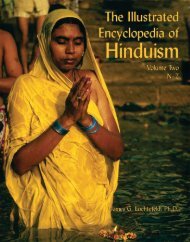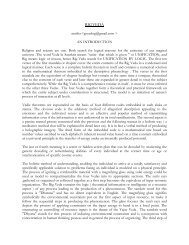- Page 2:
ENCYCLOPEDIA OF BUDDHISM
- Page 6:
ENCYCLOPEDIA OF BUDDHISM Volume One
- Page 10:
CONTENTS Preface. .................
- Page 14:
PREFACE Buddhism is one of the thre
- Page 18:
P REFACE for rendering Asian langua
- Page 22:
LIST OF ARTICLES Abhidharma Collett
- Page 26:
L IST OF A RTICLES Devadatta Max De
- Page 30:
L IST OF A RTICLES Laos Justin McDa
- Page 34:
L IST OF A RTICLES Sautrantika Coll
- Page 38:
LIST OF CONTRIBUTORS Ryuichi Abé C
- Page 42:
L IST OF C ONTRIBUTORS Alexander Ga
- Page 46:
L IST OF C ONTRIBUTORS Jan Nattier
- Page 50:
L IST OF C ONTRIBUTORS Jonathan S.
- Page 54:
SYNOPTIC OUTLINE OF ENTRIES This ou
- Page 58:
S YNOPTIC O UTLINE OF E NTRIES Juef
- Page 62:
S YNOPTIC O UTLINE OF E NTRIES Divi
- Page 66:
S YNOPTIC O UTLINE OF E NTRIES Cent
- Page 70:
MAPS THE DIFFUSION OF BUDDHISM Majo
- Page 74:
E NCYCLOPEDIA OF B UDDHISM xxxvii M
- Page 78:
E NCYCLOPEDIA OF B UDDHISM xxxix Ma
- Page 82:
A ABHIDHARMA In the centuries after
- Page 86:
A BHIDHARMA 5. Yamaka (Pairs); 6. P
- Page 90:
A BHIDHARMA invoked only as a suppl
- Page 94:
A BHIDHARMAKOŚABHA S YA tic techni
- Page 98:
A BORTION the focus of numerous ARH
- Page 102:
A GAMA/NIKA YA schools whose litera
- Page 106:
A LCHI beings in action, the Ajanta
- Page 110:
A MULETS AND T ALISMANS generally l
- Page 114:
A NANDA T EMPLE chose A nanda to se
- Page 118:
A NA TMAN/A TMAN (NO -SELF/SELF) ob
- Page 122:
A NCESTORS miniature furniture and
- Page 126:
A NITYA ( IMPERMANENCE) transfer, g
- Page 130:
A POCRYPHA eled after canonical nar
- Page 134:
A POCRYPHA ously be inherently enli
- Page 138:
A RHAT nonreturning (anagami marga)
- Page 142:
A RYADEVA or as distinctly exotic,
- Page 146:
A SCETIC P RACTICES aya 4:88) state
- Page 150:
A TISHA Bibliography Barua, B. M. A
- Page 154:
A VADA NA ters. The Avadanaśataka
- Page 158:
A YUTTHAYA (function) in analyzing
- Page 162:
B BA MIYA N Located 240 miles north
- Page 166:
B IANXIANG (TRANSFORMATION T ABLEAU
- Page 170:
B IOGRAPHY BIOGRAPHY Many religious
- Page 174:
B KA’ BRGYUD (KAGYU) the Buddha
- Page 178:
B ODH G AYA 2. The Stag lung Bka’
- Page 182:
B ODHI (AWAKENING) scholarship to r
- Page 186:
B ODHICARYA VATA RA awakening (dunw
- Page 190:
B ODHICITTA (THOUGHT OF A WAKENING)
- Page 194:
B ODHIDHARMA BODHIDHARMA Within the
- Page 198:
B ODHISATTVA( S ) 10. caramabhavika
- Page 202:
B ODHISATTVA I MAGES Early represen
- Page 206:
B ODY, PERSPECTIVES ON THE serves t
- Page 210:
B ODY, PERSPECTIVES ON THE body has
- Page 214:
B ON lde btsan (pronounced Trisong
- Page 218:
B SAM YAS D EBATE the first seven T
- Page 222:
B UDDHA( S ) say for certain is tha
- Page 226:
B UDDHA( S ) have originated at the
- Page 230:
B UDDHAGHOSA BUDDHACARITA The Buddh
- Page 234:
B UDDHAHOOD AND B UDDHA B ODIES rep
- Page 238:
B UDDHA I MAGES terms such as sahaj
- Page 242:
B UDDHA I MAGES the Buddha as a hum
- Page 246:
B UDDHA, LIFE OF THE MU LASARVA STI
- Page 250:
B UDDHA, LIFE OF THE and was near d
- Page 254:
B UDDHA, LIFE OF THE by the next bu
- Page 258:
B UDDHA, LIFE OF THE, IN A RT A rep
- Page 262:
B UDDHA, LIFE OF THE, IN A RT Buddh
- Page 266:
B UDDHAVACANA (WORD OF THE B UDDHA)
- Page 270:
B UDDHIST S TUDIES temporary Buddhi
- Page 274:
B UDDHIST S TUDIES both at indigeno
- Page 278:
B UDDHIST S TUDIES The CHAN SCHOOL
- Page 282:
B URMESE, BUDDHIST L ITERATURE IN L
- Page 286:
B U STON (BU TÖN) Lu se lu phrac v
- Page 290:
C CAMBODIA Cambodia in the twenty-f
- Page 294:
C AMBODIA A view of Angkor Wat, the
- Page 298:
C AMBODIA traditionalists within th
- Page 302:
C ANON CANDRAKIRTI Candrakrti (ca.
- Page 306:
C ANON tirety is that of the Therav
- Page 310:
C ANON A Tibetan book, printed from
- Page 314:
C AVE S ANCTUARIES sanbao ji. Thus,
- Page 318:
C AVE S ANCTUARIES The late-seventh
- Page 322:
C ENTRAL A SIA Kaniska) to Buddhism
- Page 326:
C ENTRAL A SIA, BUDDHIST A RT IN fo
- Page 330:
C HAN A RT paintings or in sculptur
- Page 334:
C HAN A RT torial counterpart to th
- Page 338:
C HAN A RT activity such as archery
- Page 342:
C HAN S CHOOL all-at-once enlighten
- Page 346:
C HAN S CHOOL Concentration on wu w
- Page 350:
C HAN S CHOOL subordinate component
- Page 354:
C HANTING AND L ITURGY Faure, Berna
- Page 358:
C HINA Bells, gongs, drums, horns,
- Page 362:
C HINA teachings were drawn to Budd
- Page 366:
C HINA ten display a tendency to re
- Page 370:
C HINA, BUDDHIST A RT IN Daoism wer
- Page 374:
C HINA, BUDDHIST A RT IN Xiangyang
- Page 378:
C HINA, BUDDHIST A RT IN stone imag
- Page 382:
C HINA, BUDDHIST A RT IN appeared d
- Page 386:
C HINA, BUDDHIST A RT IN Guanyin fr
- Page 390:
C HINESE, BUDDHIST I NFLUENCES ON V
- Page 394:
C HINUL mately be traced back to th
- Page 398:
C HRISTIANITY AND B UDDHISM influen
- Page 402:
C LERICAL M ARRIAGE IN J APAN out o
- Page 406:
C OLONIALISM AND B UDDHISM rently l
- Page 410:
C OLONIALISM AND B UDDHISM Japan (S
- Page 414:
C OMMENTARIAL L ITERATURE chong’s
- Page 418:
C OMMUNISM AND B UDDHISM tion, the
- Page 422:
C OMMUNISM AND B UDDHISM A Chinese
- Page 426:
C ONFUCIANISM AND B UDDHISM poetry
- Page 430:
C ONSCIOUSNESS, THEORIES OF Bibliog
- Page 434:
C ONSCIOUSNESS, THEORIES OF persona
- Page 438:
C ONSECRATION how disappointed he w
- Page 442:
C ONSECRATION enables a representat
- Page 446:
C OSMOLOGY Zürcher, Erik. The Budd
- Page 450:
C OSMOLOGY Cycles of time The tempo
- Page 454:
C OUNCILS, BUDDHIST But this raises
- Page 458:
C RITICAL B UDDHISM (HIHAN B UKKYO)
- Page 462:
D DAIMOKU The term daimoku, literal
- Page 466:
D ALAI L AMA Mongolian translation
- Page 470:
D ALAI L AMA Lama was given the nam
- Page 474:
D AOISM AND B UDDHISM DAO’AN Dao
- Page 478:
D AOISM AND B UDDHISM Several hagio
- Page 482:
D AOSHENG met the mysterious Man of
- Page 486:
D EATH as popular Chan adages, are
- Page 490:
D EATH to mindfulness of the three
- Page 494:
D EATH The funeral and cremation of
- Page 498:
D EATH The funeral procession of a
- Page 502:
D ECLINE OF THE D HARMA ence of NUN
- Page 506:
D ESIRE po constitutes a new dispen
- Page 510:
D GE LUGS (GELUK) Mahaprajñaparami
- Page 514:
D HARMA AND D HARMAS been added ove
- Page 518:
D HARMA AND D HARMAS A golden dharm
- Page 522:
D HARMA AND D HARMAS 1. Form or mat
- Page 526:
D HARMA AND D HARMAS 6. Attainment
- Page 530:
D HARMARAKS A dha. The fourfold dha
- Page 534:
D IAMOND S U TRA Dhyana is also def
- Page 538:
D IET obtained on the begging round
- Page 542:
D ISCIPLES OF THE B UDDHA restrict
- Page 546:
D IVINITIES bought for the Buddha a
- Page 550:
D O GEN oped in India and beyond, w
- Page 554:
D OUBT she increasingly relied on h
- Page 558:
D UH KHA ( SUFFERING) 193b) asserts
- Page 562:
D UNHUANG Whitfield, Roderick. The
- Page 566:
E ECONOMICS Before trying to determ
- Page 570:
E CONOMICS goods without which they
- Page 574:
E DUCATION EDUCATION For centuries,
- Page 578:
E NNIN and the environmentalist Ch
- Page 582:
E NTERTAINMENT AND P ERFORMANCE of
- Page 586:
E SOTERIC A RT, EAST A SIA (Vidyara
- Page 590:
E SOTERIC A RT, EAST A SIA divide i
- Page 594:
E SOTERIC A RT, SOUTH AND S OUTHEAS
- Page 598:
E SOTERIC A RT, SOUTH AND S OUTHEAS
- Page 602:
E THICS Bibliography Fisher, Robert
- Page 606:
E THICS cially compassion and wisdo
- Page 610:
E TIQUETTE Wayman, Alex. Ethics of
- Page 614:
E UROPE The Dharmapala Center, Kand
- Page 618:
E VIL EVIL A word that closely appr
- Page 622:
E XOTERIC-ESOTERIC (KENMITSU) BUDDH
- Page 626:
E XOTERIC-ESOTERIC (KENMITSU) BUDDH
- Page 630:
E XOTERIC-ESOTERIC (KENMITSU) BUDDH
- Page 634:
F FAITH Few notions elicit more deb
- Page 638:
F AMENSI sired state of mind has th
- Page 642:
F ANWANG JING (BRAHMA ’ S N ET S
- Page 646:
F AXIANG S CHOOL tures (T376, T745)
- Page 650:
F ESTIVALS AND C ALENDRICAL R ITUAL
- Page 654:
F ESTIVALS AND C ALENDRICAL R ITUAL
- Page 658:
F OLK R ELIGION: AN O VERVIEW spiri
- Page 662:
F OLK R ELIGION, JAPAN cerns, is be
- Page 666:
F OLK R ELIGION, SOUTHEAST A SIA mo
- Page 670:
F OUR N OBLE T RUTHS Brahmanas. In
- Page 674:
F OUR N OBLE T RUTHS TABLE 1 Buddha
- Page 678:
G GANDHA RA. See India; India, Nort
- Page 682:
G AVA M PATI Salomon, Richard. A Ga
- Page 686:
G ENDER tinctions thus constitute a
- Page 690:
G ENDER tation, then, the sexual tr
- Page 694:
G HOST F ESTIVAL GENSHIN Genshin (E
- Page 698:
G HOSTS AND S PIRITS Mahamaudgalyay
- Page 702:
G YO NEN Todaiji, where he later be
- Page 706:
H HACHIMAN Hachiman is one of the m
- Page 710:
H EAVENS The Heart Su tra opens wit
- Page 714:
H ELLS not simply ground to bits, b
- Page 718:
H ELLS, IMAGES OF Ksitigarbha (Diza
- Page 722:
H ERMENEUTICS relating to ŚU NYATA
- Page 726:
H IMALAYAS, BUDDHIST A RT IN A mura
- Page 730:
H IMALAYAS, BUDDHIST A RT IN The te
- Page 734:
H IMALAYAS, BUDDHIST A RT IN of dei
- Page 738:
H INDUISM AND B UDDHISM whole a cle
- Page 742:
H INDUISM AND B UDDHISM mas have re
- Page 746:
H ISTORY dhism as sharing an Indian
- Page 750:
H ISTORY opment and differentiation
- Page 754:
H UAYAN A RT Senchakushu English Tr
- Page 758:
H UAYAN A RT the temple building, c
- Page 762:
H UAYAN S CHOOL Buddhism. The scrip
- Page 766:
H UAYAN S CHOOL Zhiyan came from a
- Page 770:
H UAYAN S CHOOL the subsequent doct
- Page 774:
H UINENG origin of all things, it p
- Page 778:
H YUJŎNG Bibliography Liebenthal,
- Page 782:
I ICCHANTIKA The notion of the icch
- Page 786:
I NDIA status. Those Brahmins claim
- Page 790:
I NDIA orthodoxy. Unfortunately, wi
- Page 794:
I NDIA Buddhism. It soon developed
- Page 798:
I NDIA sponsibility for transformin
- Page 802:
I NDIA, BUDDHIST A RT IN The exteri
- Page 806:
I NDIA, BUDDHIST A RT IN and some o
- Page 810:
I NDIA, BUDDHIST A RT IN The classi
- Page 814:
I NDIA, NORTHWEST Margiana Marv TUR
- Page 818:
I NDIA, SOUTH INDIA, SOUTH Evidence
- Page 822:
I NDONESIA AND THE M ALAY P ENINSUL
- Page 826:
I NDONESIA, BUDDHIST A RT IN Relief
- Page 830:
I NITIATION See also: Divinities; H
- Page 834:
I NTERMEDIATE S TATES Strickmann, M
- Page 838:
I NTERMEDIATE S TATES One of the mo
- Page 842:
I SLAM AND B UDDHISM India. More de
- Page 846:
J JAINISM AND BUDDHISM Jainism and
- Page 850:
J APAN dhism often seems marginal t
- Page 854:
J APAN The Kinkakuji (Golden Pavili
- Page 858:
J APAN iar institutional struggle f
- Page 862:
J APAN, BUDDHIST A RT IN Heian, thr
- Page 866:
J APAN, BUDDHIST A RT IN fer merit
- Page 870:
J APAN, BUDDHIST A RT IN attitude.
- Page 874:
J APANESE, BUDDHIST I NFLUENCES ON
- Page 878:
J APANESE R OYAL F AMILY AND B UDDH
- Page 882:
J A TAKA, ILLUSTRATIONS OF mals (bu
- Page 886:
J EWELS Jatakamalas, 2nd revised ed
- Page 890:
J UEFAN (HUIHONG) she divined that
- Page 894:
K KAGYU. See Bka’ brgyud KAILA Ś
- Page 898:
K A LACAKRA complex of the numerous
- Page 902:
K AMAKURA B UDDHISM, JAPAN Newman,
- Page 906:
K AMAKURA B UDDHISM, JAPAN who was
- Page 910:
K ARMA ( ACTION) is commonly acknow
- Page 914:
K ARMA PA this question in his Abhi
- Page 918:
K ARUN A (COMPASSION) Sikkim. He tr
- Page 922:
K HMER, BUDDHIST L ITERATURE IN Dal
- Page 926:
K IHWA by the Buddhist Institute, a
- Page 930:
K LONG CHEN PA (LONGCHENPA) and Rom
- Page 934:
K O AN (960-1279). The Japanese pro
- Page 938:
K ONJAKU MONOGATARI few koans over
- Page 942:
K OREA tribal religious practices.
- Page 946:
K OREA more than eighty thousand wo
- Page 950:
K OREA, BUDDHIST A RT IN a preparat
- Page 954:
K OREA, BUDDHIST A RT IN made of la
- Page 958:
K OREAN, BUDDHIST I NFLUENCES ON V
- Page 962:
K U KAI Sa, Chaedong. A Study of th
- Page 966:
K YŎNGHŎ Tsukamoto Zenryu. A Hist
- Page 970:
L LAITY The laity in Buddhism makes
- Page 974:
L AITY dle and thread. Founding and
- Page 978:
L AITY led by groups of priests and
- Page 982:
L ANGUAGE, BUDDHIST P HILOSOPHY OF
- Page 986:
L ANGUAGES Initially, preservation
- Page 990:
L ANGUAGES and received considerabl
- Page 994:
L AOS are nithans (folktales such a
- Page 998:
L AW AND B UDDHISM Pavie, Auguste.
- Page 1002:
L INEAGE Tambiah, H. W. Principles
- Page 1006:
L INEAGE TABLE 2 Chan lineage based
- Page 1010:
L OCAL D IVINITIES AND B UDDHISM ti
- Page 1014:
L OCAL D IVINITIES AND B UDDHISM co
- Page 1018:
L OGIC tions. The essential problem
- Page 1022:
L OTUS S U TRA (SADDHARMAPUN D ARI
- Page 1026:
L OTUS S U TRA (SADDHARMAPUN D ARI
- Page 1030:
L OTUS S U TRA (SADDHARMAPUN D ARI
- Page 1034:
L OTUS S U TRA (SADDHARMAPUN D ARI
- Page 1038:
ENCYCLOPEDIA OF BUDDHISM
- Page 1042:
ENCYCLOPEDIA OF BUDDHISM Volume Two
- Page 1046:
M MADHYAMAKA SCHOOL The Madhyamaka
- Page 1050:
M ADHYAMAKA S CHOOL when ignorant p
- Page 1054:
M ADHYAMAKA S CHOOL bodhisattva fro
- Page 1058:
M A GCIG LAB SGRON (MACHIG L ABDRÖ
- Page 1062:
M AHA MAUDGALYA YANA jor Buddha rel
- Page 1066:
M AHA PRAJA PATI G AUTAMI strongly
- Page 1070:
M AHA VASTU course and Saraha’s i
- Page 1074:
M AHA YA NA tury or more and, there
- Page 1078:
M AHA YA NA embedded in mainstream,
- Page 1082:
M AHA YA NA hayana sutras that can,
- Page 1086:
M AHA YA NA P RECEPTS IN J APAN Bib
- Page 1090:
M AINSTREAM B UDDHIST S CHOOLS sion
- Page 1094:
M AINSTREAM B UDDHIST S CHOOLS prom
- Page 1098:
M AINSTREAM B UDDHIST S CHOOLS Much
- Page 1102:
M AITREYA Mahayana The development
- Page 1106:
M AN D ALA Mandala of the Womb Worl
- Page 1110:
M AN D ALA ifestation of Vairocana
- Page 1114:
M AR PA (MARPA) armies flee. This e
- Page 1118:
M ARTIAL A RTS Child monks perform
- Page 1122:
M ARTIAL A RTS agility, such as lea
- Page 1126:
M EDICINE medicines (Bhesajjakhandh
- Page 1130:
M EDITATION audible, neither heavy
- Page 1134:
M EDITATION alizing one’s teacher
- Page 1138:
M EDITATION Meditation in Mahayana
- Page 1142:
M EDITATION A twelfth-century statu
- Page 1146:
M EDITATION The system remained per
- Page 1150:
M EIJI B UDDHIST R EFORM ration of
- Page 1154:
M IJIAO (ESOTERIC) SCHOOL Sparrows
- Page 1158:
M IJIAO (ESOTERIC) SCHOOL the Vajra
- Page 1162:
M ILLENARIANISM AND M ILLENARIAN M
- Page 1166:
M ILLENARIANISM AND M ILLENARIAN M
- Page 1170:
M IRACLES of purity is required for
- Page 1174:
M IRACLES lence, prompting the empe
- Page 1178:
M ODERNITY AND B UDDHISM tiation ha
- Page 1182:
M ODERNITY AND B UDDHISM the case,
- Page 1186:
M ONASTIC A RCHITECTURE thing as co
- Page 1190:
M ONASTIC A RCHITECTURE Almost ever
- Page 1194:
M ONASTIC A RCHITECTURE dormitories
- Page 1198:
M ONASTIC A RCHITECTURE The Phoenix
- Page 1202:
M ONASTICISM of the desire of wealt
- Page 1206:
M ONASTICISM The categories of monk
- Page 1210:
M ONGOLIA lier than circa 1451 in K
- Page 1214:
M ONGOLIA to Khalkha to found the T
- Page 1218:
M ONKS ment failed to convince the
- Page 1222:
M ONKS Monks at a ceremony at Biech
- Page 1226:
M U DRA AND V ISUAL I MAGERY by the
- Page 1230:
M U DRA AND V ISUAL I MAGERY FIGURE
- Page 1234:
M URAKAMI S ENSHO thereby its place
- Page 1238:
M YANMAR In 1057 C.E., the Bamar ki
- Page 1242:
M YANMAR, BUDDHIST A RT IN (Pali, s
- Page 1246:
M YANMAR, BUDDHIST A RT IN tional p
- Page 1250:
N NA GA RJUNA The Indian philosophe
- Page 1254:
N A ROPA the throne. The scandal hi
- Page 1258:
N ATIONALISM AND B UDDHISM Monks ca
- Page 1262:
N ENBUTSU (CHINESE, NIANFO; KOREAN,
- Page 1266:
N EPAL Nepalese lay Buddhists circu
- Page 1270:
N EPAL in ancient India. The “Mah
- Page 1274:
N EWARI, BUDDHIST L ITERATURE IN (S
- Page 1278:
N ICHIREN S CHOOL he devised a call
- Page 1282:
N ICHIREN S CHOOL Buddha’s teachi
- Page 1286:
N INE M OUNTAINS S CHOOL OF S ŎN H
- Page 1290:
N IRVA N A son seeking to character
- Page 1294:
N IRVA N A tional cessation, and ye
- Page 1298:
N IRVA N A S U TRA other times, the
- Page 1302:
N UNS tion, approximately one hundr
- Page 1306:
N UNS Cambodia they are known as do
- Page 1310:
N UNS Tsomo, Karma Lekshe. Sisters
- Page 1314:
O OBON. See Ghost Festival OM MAN I
- Page 1318:
O RDINATION śramanerika. In Southe
- Page 1322:
O RDINATION monks to build platform
- Page 1326:
O RIGINAL E NLIGHTENMENT (HONGAKU)
- Page 1330:
O XHERDING P ICTURES Habito, Ruben
- Page 1334:
P PADMASAMBHAVA Active in the late
- Page 1338:
P A LI, BUDDHIST L ITERATURE IN Tib
- Page 1342:
P A LI, BUDDHIST L ITERATURE IN (Sa
- Page 1346:
P ANCHEN L AMA von Hinüber, Oskar.
- Page 1350:
P A RAMITA (PERFECTION) Funan (mode
- Page 1354:
P ARISH (DANKA, TERAUKE) SYSTEM IN
- Page 1358:
P ATH blessings. In northeastern Th
- Page 1362:
P ATH (ACTION) and its fruition, an
- Page 1366:
P ATH tice is actually a prevenient
- Page 1370:
P ERSECUTIONS A visitor in 1997 app
- Page 1374:
P ERSECUTIONS eliminated from the S
- Page 1378:
P ERSECUTIONS munist insurgents. Ot
- Page 1382:
P HILOSOPHY Stuart-Fox, Martin. Bud
- Page 1386:
P HILOSOPHY makes major choices in
- Page 1390:
P ILGRIMAGE Yorimichi and his desce
- Page 1394:
P ILGRIMAGE the Buddhist heartland
- Page 1398:
P LATFORM S U TRA OF THE S IXTH P A
- Page 1402:
P OLITICS AND B UDDHISM Mair, Victo
- Page 1406:
P OLITICS AND B UDDHISM thodox trad
- Page 1410:
P ORTRAITURE these degrees are full
- Page 1414:
P OTALA Throughout Japan’s mediev
- Page 1418:
P RAJN A (WISDOM) reality. For ear
- Page 1422:
P RA TIMOKS A seminate these partic
- Page 1426:
P RATITYASAMUTPA DA (DEPENDENT O RI
- Page 1430:
P RAYER canonical texts explain, he
- Page 1434:
P RECEPTS Sharf, Robert. “The Scr
- Page 1438:
P RINTING T ECHNOLOGIES different v
- Page 1442:
P RINTING T ECHNOLOGIES in China, K
- Page 1446:
P SYCHOLOGY seems peculiar or surpr
- Page 1450:
P SYCHOLOGY ever, claim that the re
- Page 1454:
P SYCHOLOGY designation” or “pr
- Page 1458:
P SYCHOLOGY tions, which do not val
- Page 1462:
P SYCHOLOGY forts go well beyond so
- Page 1466:
P SYCHOLOGY Chang, Ruth, ed. Incomm
- Page 1470:
P SYCHOLOGY Langer, Ellen J. Mindfu
- Page 1474:
P URE L AND A RT source, so the sel
- Page 1478:
P URE L AND A RT A bas-relief in li
- Page 1482:
P URE L AND A RT The Phoenix Hall a
- Page 1486:
P URE L AND B UDDHISM up in some Ma
- Page 1490:
P URE L AND B UDDHISM lands, the co
- Page 1494:
P URE L ANDS Gómez, Luis O., trans
- Page 1498:
P URE L ANDS Amitabha in the Wester
- Page 1502:
P URE L AND S CHOOLS Mahayana expre
- Page 1506:
P URE L AND S CHOOLS teachings. Shi
- Page 1510:
R RA HULA Rahula was the son of Sid
- Page 1514:
R EBIRTH Rebirth and cosmic causali
- Page 1518:
R ELICS A ND R ELICS C ULTS RELICS
- Page 1522:
R ELICS A ND R ELICS C ULTS were re
- Page 1526:
R ELIQUARY Brown, Peter. The Cult o
- Page 1530:
R EPENTANCE AND C ONFESSION A secon
- Page 1534:
R ITUAL bering, reciting, and expla
- Page 1538:
R ITUAL A Shingon priest performs a
- Page 1542:
R ITUAL O BJECTS A monk holds praye
- Page 1546:
R NYING MA (NYINGMA) ceremony. Usua
- Page 1550:
R OBES AND C LOTHING region. In rea
- Page 1554:
R OBES AND C LOTHING FIGURE 1 Seven
- Page 1558:
R YO KAN Kennedy, Alan. Manteau de
- Page 1562:
S SAHA WORLD. See Cosmology SAICHO
- Page 1566:
S A N CI process characterized by
- Page 1570:
S AṄGHA the PATH. They are called
- Page 1574:
S AṄGHA Tibetan monks sitting tog
- Page 1578:
S ANSKRIT, BUDDHIST L ITERATURE IN
- Page 1582:
S ANSKRIT, BUDDHIST L ITERATURE IN
- Page 1586:
ŚA RIPUTRA Hodge, Stephen, trans.
- Page 1590:
S A SKYA (SAKYA) alogues and other
- Page 1594:
S A SKYA P AN D ITA (SAKYA P AN D I
- Page 1598:
S CRIPTURE See also: Mainstream Bud
- Page 1602:
S CRIPTURE First, scriptures are me
- Page 1606:
S ENGZHAO Autocremation was primari
- Page 1610:
S EXUALITY Bibliography Gethin, Rup
- Page 1614:
S EXUALITY Japan, most Buddhist mon
- Page 1618:
S HINGON B UDDHISM, JAPAN The incip
- Page 1622:
S HINTO (HONJI S UIJAKU) AND B UDDH
- Page 1626:
S HINTO (HONJI S UIJAKU) AND B UDDH
- Page 1630:
S HO BO GENZO demons (YAKSA). These
- Page 1634:
S HUGENDO Historical development an
- Page 1638:
S ILK R OAD Win Pe. The Shwedagon.
- Page 1642:
S INHALA, BUDDHIST L ITERATURE IN B
- Page 1646:
S KANDHA (AGGREGATE) Obeyesekere, R
- Page 1650:
S Ŏ KKURAM Singh, Madan Mohan. “
- Page 1654:
S OUTHEAST A SIA, BUDDHIST A RT IN
- Page 1658:
S OUTHEAST A SIA, BUDDHIST A RT IN
- Page 1662:
S OUTHEAST A SIA, BUDDHIST A RT IN
- Page 1666:
S PACE, SACRED bas-relief represent
- Page 1670:
S PACE, SACRED is the Pure Land of
- Page 1674:
S PACE, SACRED Monks in the Sacred
- Page 1678:
S RI L ANKA SRI LANKA Sri Lanka is
- Page 1682:
S RI L ANKA lowed during the politi
- Page 1686:
S RI L ANKA, BUDDHIST A RT IN S. W.
- Page 1690:
S RI L ANKA, BUDDHIST A RT IN Sri L
- Page 1694:
S TU PA (1877-1947) was of the view
- Page 1698:
S TU PA decessors of Gautama, the b
- Page 1702:
S TU PA the most important remains
- Page 1706:
Ś U NYATA (EMPTINESS) after 1340 a
- Page 1710:
S U TRA I LLUSTRATIONS This twelfth
- Page 1714:
S YNCRETIC S ECTS: THREE T EACHINGS
- Page 1718:
T TACHIKAWARYU Tachikawaryu is the
- Page 1722:
T AIWAN Buddhists to maintain their
- Page 1726:
T AKUAN S O HO However, the most un
- Page 1730:
T ANTRA Siddhas may have been a min
- Page 1734:
T ANTRA equated with the Great Perf
- Page 1738:
T ANTRA reliability of this source
- Page 1742:
T ATHA GATAGARBHA within themselves
- Page 1746:
T HAI, BUDDHIST L ITERATURE IN Thre
- Page 1750:
T HAILAND A restored statue of the
- Page 1754:
T HAILAND began in the Ayutthaya pe
- Page 1758:
T HAILAND Thai Buddhists celebrate
- Page 1762:
T HERAVA DA even other religions. T
- Page 1766:
T HERAVA DA images and inauguration
- Page 1770:
T HERAVA DA A RT AND A RCHITECTURE
- Page 1774:
T HERAVA DA A RT AND A RCHITECTURE
- Page 1778:
T IANTAI S CHOOL than one hundred b
- Page 1782:
T IANTAI S CHOOL selfhood, a first
- Page 1786:
T IANTAI S CHOOL Zhanran and the bu
- Page 1790:
T IBET Bibliography Chan, Chi-wah.
- Page 1794:
T IBET culminates in the Great Perf
- Page 1798:
T IBET canonical compilation proces
- Page 1802:
T IBET Tibetan Buddhists prostrate
- Page 1806:
T IBETAN B OOK OF THE D EAD Tucci,
- Page 1810:
T SONG KHA PA TRIRATNA. See Refuges
- Page 1814:
U ŬICH’ŎN Ŭich’ŏn (Taegak k
- Page 1818:
U NITED S TATES two Asian Buddhists
- Page 1822:
U NITED S TATES American Freshman (
- Page 1826:
U NITED S TATES were born into the
- Page 1830:
U PA YA Bibliography Malalasekera,
- Page 1834:
U SURY practices. The MU LASARVASTI
- Page 1838:
V VAJRAYA NA Vajrayana is an umbrel
- Page 1842:
V AM SA lationship between practice
- Page 1846:
V IETNAM coming impervious to weapo
- Page 1850:
V IETNAM the Lý and Trâǹ, civil
- Page 1854:
V IETNAMESE, BUDDHIST I NFLUENCES O
- Page 1858:
V INAYA Indian opponents. These Bud
- Page 1862:
V INAYA the vinaya texts that we ha
- Page 1866:
V IPASSANA (SANSKRIT, VIPAŚYANA )
- Page 1870: V OWS ject of Buddhist art, ritual,
- Page 1874: W WAR The list of the laureates of
- Page 1878: W AR Buddha statues in the wreckage
- Page 1882: W ILDERNESS M ONKS Harvey, Peter. A
- Page 1886: W OMEN proceeds in tension with sev
- Page 1890: W OMEN eral contemporary movements
- Page 1894: W ŎNCH’ ŬK the second patriarch
- Page 1898: W ORSHIP distinctions as secular an
- Page 1902: W ORSHIP sites from which there are
- Page 1906: X XUANZANG Xuanzang (Ci’en, ca. 6
- Page 1910: Y YAKSA Yaksa (Pali, yakkha) are in
- Page 1914: Y IXUAN translated approximately fi
- Page 1918: Y OGA CA RA S CHOOL Buddhist path w
- Page 1924: Y OGA CA RA S CHOOL means desiring
- Page 1928: Y OGA CA RA S CHOOL 1. The “provi
- Page 1932: Y UN’ GANG China. Thereafter loca
- Page 1936: Z EN, POPULAR C ONCEPTIONS OF belon
- Page 1940: Z HAO LUN it is a product of the ti
- Page 1944: Z HUHONG and so on. His ideas were
- Page 1948: This page intentionally left blank
- Page 1952: This page intentionally left blank
- Page 1956: I NDIA 1891 ANAGA RIKA DHARMAPA LA
- Page 1960: S OUTHEAST A SIA 1236 MONKS from Ka
- Page 1964: C HINA 645 XUANZANG (ca. 600-664) r
- Page 1968: J APAN AND K OREA 1010 The Korean k
- Page 1972:
This page intentionally left blank
- Page 1976:
T IBET AND THE H IMALAYAS 1642 Gush
- Page 1980:
I NDEX VOLUME 1, PP. 1-478: VOLUME
- Page 1984:
I NDEX VOLUME 1, PP. 1-478: VOLUME
- Page 1988:
I NDEX VOLUME 1, PP. 1-478: VOLUME
- Page 1992:
I NDEX VOLUME 1, PP. 1-478: VOLUME
- Page 1996:
I NDEX VOLUME 1, PP. 1-478: VOLUME
- Page 2000:
I NDEX VOLUME 1, PP. 1-478: VOLUME
- Page 2004:
I NDEX VOLUME 1, PP. 1-478: VOLUME
- Page 2008:
I NDEX VOLUME 1, PP. 1-478: VOLUME
- Page 2012:
I NDEX VOLUME 1, PP. 1-478: VOLUME
- Page 2016:
I NDEX VOLUME 1, PP. 1-478: VOLUME
- Page 2020:
I NDEX VOLUME 1, PP. 1-478: VOLUME
- Page 2024:
I NDEX VOLUME 1, PP. 1-478: VOLUME
- Page 2028:
I NDEX VOLUME 1, PP. 1-478: VOLUME
- Page 2032:
I NDEX VOLUME 1, PP. 1-478: VOLUME
- Page 2036:
I NDEX VOLUME 1, PP. 1-478: VOLUME
- Page 2040:
I NDEX VOLUME 1, PP. 1-478: VOLUME
- Page 2044:
I NDEX VOLUME 1, PP. 1-478: VOLUME
- Page 2048:
I NDEX VOLUME 1, PP. 1-478: VOLUME
- Page 2052:
LEFT: The bodhisattva Samantabhadra
- Page 2056:
TOP: The recumbent Buddha entering
- Page 2060:
A carved panel depicting an unident
- Page 2064:
TOP: Illustration from the Amitabha
- Page 2068:
TOP: A Buddhist monastery in the mo
- Page 2072:
TOP: The Ratnaku dapariprccha (Ratn
- Page 2076:
The horrific celestial buddha Śam
- Page 2080:
TOP: Nichiren (1222-1282), founder


















